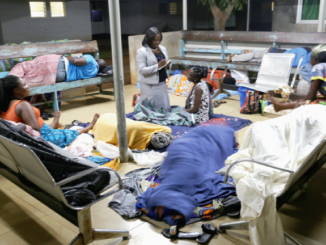The Ghana Health Service (GHS), has called upon other government agencies and partners to urgently invest in holistic services for young children, especially those at risk, to give them the best start in life.
Dr Patrick Kuma Aboagye, the Director for the Family Health Division of the GHS, who was speaking at a national media sensitisation meeting on the Nurturing Care Framework implementation in Ghana on Wednesday, said this could be done by increasing the overall budget allocation to Early Childhood Development (ECD) services.
He said enhanced investment would help the relevant agencies to provide the necessary services in the area of health, nutrition, child protection, stimulation and early learning from birth.
That would be through enhanced capacities and competences, and for supportive monitoring mechanisms of policy level and frontline personnel such as; health, social workers, and those in the field of ECD.
He indicated that early investment had lifelong and intergenerational benefits, and that Policies, information and services were as important as multisectoral collaboration.
It could also have major effects on global and national economies, health, education and welfare systems, while intergenerational cycles of poverty and disadvantages could further hinder equitable growth and prosperity, he said.
Dr Aboagye said the sensitisation meeting, was therefore part of the GHS’s efforts to move the process further, by raising awareness, mobilising public support and educating the populace through sustained media advocacy drive on the importance of nurturing care in early childhood development.
He said the GHS, the Ministry of Health and its key partners had outlined actions to roll out the global initiative on the Nurturing Care Framework for Early Childhood Development starting with a national launch to jump start implementation of activities in the country.
The main focus of the campaign was to create awareness about the fact that in the early years of life, especially the first 1,000 days from conception to the second birthday, babies and young children need nutrition, stimulation, protection and love for optimal brain development and the best start in life, he said.
He described early childhood as the period of incredible brain development, which built the basis for future learning, and the period of special sensitivity for child development and therefore the most formative experiences of young children came from nurturing care.
Dr Aboagye explained the concept of nurturing care as ensuring a stable environment that was sensitive to children’s health and nutritional needs, with protection from threats, opportunities for early learning, and interactions that were responsive, emotionally supportive, and developmentally stimulating.
He said it was in response to this global threat of children failing to thrive, and the need for strategic integration across sectors to better support holistic child development, that the Nurturing Care Framework (NCF) was launched by the World Health Organisation (WHO) and its partners in May 2018 and followed by a national inauguration by Ghana’s Ministry of Health.
He affirmed the commitment of the GHS and its partners to implementing the NCF through the delivery of integrated programmes for coordinated health, nutrition safety and security and other early childhood investments.
Dr Isabella Sagoe-Moses, the Deputy Director for Reproductive and Child Health at the Family Health Division of the GHS, said although there was currently country-level health and nutrition activities that promoted early childhood psychosocial stimulation and improved interaction between parents, caregivers and young children, more work was needed for effective outcomes.
She read a six-bullet point call to action on implementing the Nurturing Care Framework in Ghana, among which was the call for investment in high quality parenting, family learning and support programmes.
There was also the call for investment in behaviour change communication for ECD, improved coordination and strategic leadership, expanded services, especially early stimulation across multiple existing platforms, as well as data collection on key early childhood development indicators.
She said parents and other primary caregivers were the single most important factors in ensuring children had the best start in life, suggesting that parental behaviour and activities with children were highly linked with improved child development outcomes.
There was the need for both universal and targeted parenting and family support programmes to ensure all parents had the ability, capacity, knowledge, behaviours and positive attitudes to support their children early in life, saying marginalisation increased family stress, which in turn affected the ability of caregivers to provide adequate care and stimulation to young children.
Dr Sagoe-Moses said although the Government recently dedicated some resources to roll out the NCF to achieve the Sustainable Development Goals (SDG), especially the fourth goal which related to access to quality ECD services, its success would require strengthened stakeholder collaboration to implement the NCF.
She said the ECD being cross-sectoral and cross-thematic in nature, required the participation and contribution of multiple actors in order to realise the full benefits, taking great care to support children holistically.
–
GNA




